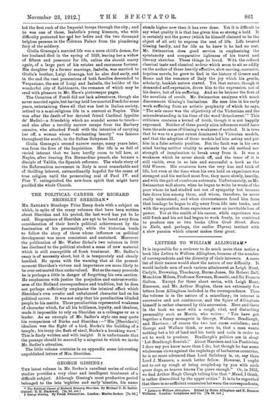GEORGE GISSING.f.
THE latest volume in Mr. Seeker's excellent series of critical studies provides a very clear and intelligent treatment of a difficult subject. Although Gissing's most productive period belonged to the late 'eighties and early 'nineties, his name
'4' The Political Career of Richard Brinsley Sheridan. By Michael T. H. Sadler. Oxford: B. H. Blackwell. De. 6d. netl t George Oissiltg, By Frank Swinnerton. London: Martin Becker. [7s. ed.] stands higher now than it has ever done. Yet it is difficult to say what quality it is that has given him so strong a hold. It is certainly not the power (which he himself claimed to be the object of all art) to express the zest of life. Life treated Gissing hardly, and for life as he knew it he had no zest. Mr. Swinnerton does good service in emphasizing the spontaneity and comparative lightness of his travel and literary sketches. These things he loved. With the refined classical taste and classical ardour which seem to sit so oddly on the author of those heavily effective, slow-moving, corrosive, hopeless novels, he grew to find in the history of Greece and Rome and the romance of Italy the joy which his gentle, scholarly, bookish nature craved. Yet that nature, though it demanded self-expression, drove him to the expression, not of his desire, but of his suffering. And so he became the first of the novelists of revolt. Mr. Swinnerton analyses with much discernment Gissing's limitations. He sees him in his early work suffering from an artistic perplexity of which he says, " The sole cause was the objectivity of the Victorians and the misunderstanding in his time of the word 'detachment.'" This criticism contains a kernel of truth, though it is not happily expressed. Neither of these purely alien influences could have been the sole cause of Gissing's weakness of method. It is true that he was to a great extent dominated by Victorian models, and that the adoption of these models led him astray and put him in a false artistic position. But the fault was in his own mind having neither vitality to animate the old method nor strength of imagination to break away from it. It was a weakness which he never shook off, and the trace of it is still visible, even in so late and successful a book as the Odd Women. His creatures have the very hue and trick of life, but even at the time when his own hold on experience was strongest and his method most free, they move slowly, heavily, and with the gait of cumbrous automata. Unfortunately, as Mr. Swinnerton well shows, when he began to write he wrote of the poor whom he had studied not out of sympathy but because fate drove him among them, and whom, therefore, he never really understood; and when circumstances freed him from that bondage he began to slip away from life into books, and with the separation from experience came an inevitable loss of power. Yet at the zenith of his career, while experience was still fresh and his art had begun to work freely, be contrived to produce one or two books (New Grub Street, Born in Exile, and, perhaps, the earlier Thyrza) instinct with a slow passion which almost makes them great.














































 Previous page
Previous page